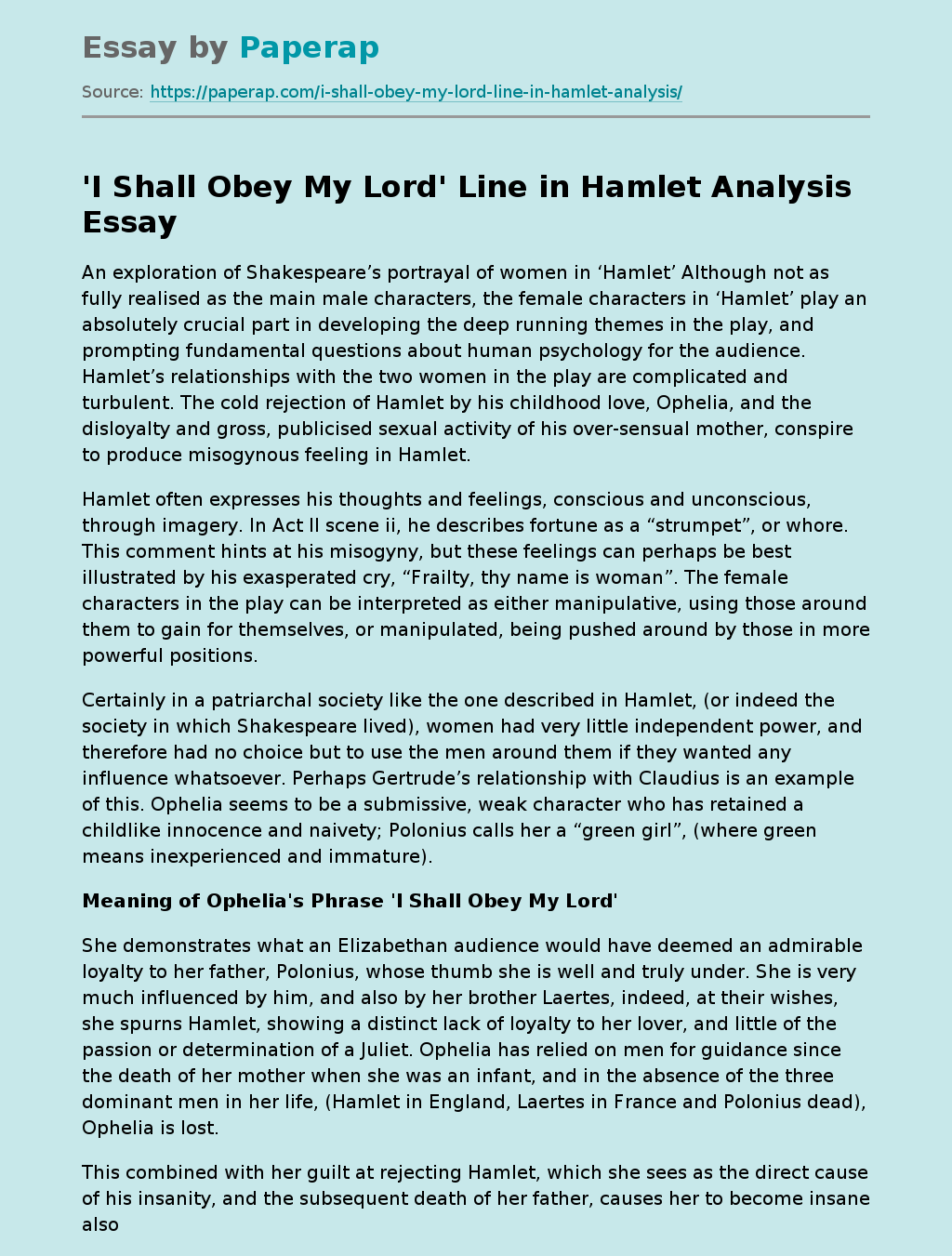'I Shall Obey My Lord' Line in Hamlet Analysis
An exploration of Shakespeare’s portrayal of women in ‘Hamlet’ Although not as fully realised as the main male characters, the female characters in ‘Hamlet’ play an absolutely crucial part in developing the deep running themes in the play, and prompting fundamental questions about human psychology for the audience. Hamlet’s relationships with the two women in the play are complicated and turbulent. The cold rejection of Hamlet by his childhood love, Ophelia, and the disloyalty and gross, publicised sexual activity of his over-sensual mother, conspire to produce misogynous feeling in Hamlet.
Hamlet often expresses his thoughts and feelings, conscious and unconscious, through imagery. In Act II scene ii, he describes fortune as a “strumpet”, or whore. This comment hints at his misogyny, but these feelings can perhaps be best illustrated by his exasperated cry, “Frailty, thy name is woman”. The female characters in the play can be interpreted as either manipulative, using those around them to gain for themselves, or manipulated, being pushed around by those in more powerful positions.
Certainly in a patriarchal society like the one described in Hamlet, (or indeed the society in which Shakespeare lived), women had very little independent power, and therefore had no choice but to use the men around them if they wanted any influence whatsoever. Perhaps Gertrude’s relationship with Claudius is an example of this. Ophelia seems to be a submissive, weak character who has retained a childlike innocence and naivety; Polonius calls her a “green girl”, (where green means inexperienced and immature).
Meaning of Ophelia’s Phrase ‘I Shall Obey My Lord’
She demonstrates what an Elizabethan audience would have deemed an admirable loyalty to her father, Polonius, whose thumb she is well and truly under. She is very much influenced by him, and also by her brother Laertes, indeed, at their wishes, she spurns Hamlet, showing a distinct lack of loyalty to her lover, and little of the passion or determination of a Juliet. Ophelia has relied on men for guidance since the death of her mother when she was an infant, and in the absence of the three dominant men in her life, (Hamlet in England, Laertes in France and Polonius dead), Ophelia is lost.
This combined with her guilt at rejecting Hamlet, which she sees as the direct cause of his insanity, and the subsequent death of her father, causes her to become insane also. As Anne Barton puts it, in ‘William Shakespeare – Four Tragedies’, Ophelia doesn’t commit suicide; when she accidentally falls into the stream she “simply yields to the current as she always has done in life”. This epitomises Ophelia’s primarily submissive temperament. It could be argued that Ophelia in fact plays the part of manipulator, as opposed to the manipulated.
Perhaps she rejects Hamlet to please her father, but with a selfish motive, to further her own cause in some way. In Act III scene i, she joins the plot to discover the cause of Hamlet’s madness, and in doing so deceives him, saying that her father is at home, when in fact he is hidden behind the arras, eavesdropping on the conversation. It could also be argued that Ophelia did in fact commit suicide, as a last act of attempted revenge on Hamlet for withdrawing his love from her.
Whether or not she is manipulative, she seems impassionate in her love towards Hamlet. She heeds her father and brother and fails to fight for her relationship with him, indeed when Polonius warns against involvement with the prince, Ophelia is typically compliant, replying merely, “I shall obey, my Lord”. To Hamlet and the audience it may seem as if Ophelia is unloving and cruelly rejecting, but perhaps she does love Hamlet, but only as far as her childlike capacity allows, without the passion and conviction of a more mature, independent character.
Ophelia confuses Hamlet. When he cries, “Get thee to a nunnery”, he perhaps cannot decide whether she is as chaste and virginal as she seems or in fact as whorish and sexually motivated as his mother. If she is what she seems, the world of lust, murder and incest is no place for her, but if she is like Gertrude, perhaps ‘nunnery’ in its other sense, i. e. brothel, is a more appropriate place for her. Shakespeare’s creation of Ophelia as a weak and childlike character, with a distinct lack of heroism, is necessary.
Shakespeare did not want to place great emphasis on the love story; if Hamlet had been madly in love with Ophelia, it might have interfered with the main storyline. She had to be a subordinate character, unequal to Hamlet in spirit or intelligence; otherwise she would have been more inspiring and able to help Hamlet. This is demonstrated when, under her father’s advice, she ends her blossoming relationship with Hamlet without question – hardly the actions of a Cleopatra or a Portia.
'I Shall Obey My Lord' Line in Hamlet Analysis. (2019, Dec 05). Retrieved from https://paperap.com/i-shall-obey-my-lord-line-in-hamlet-analysis/

